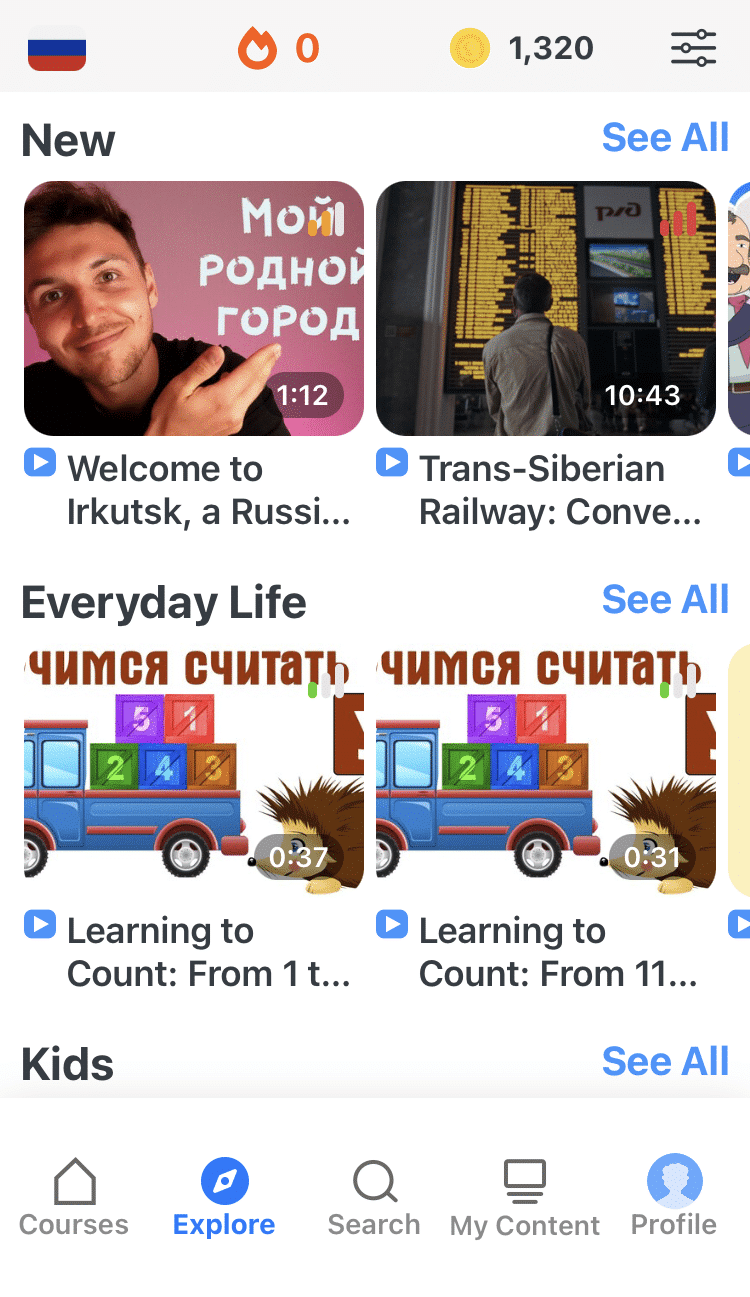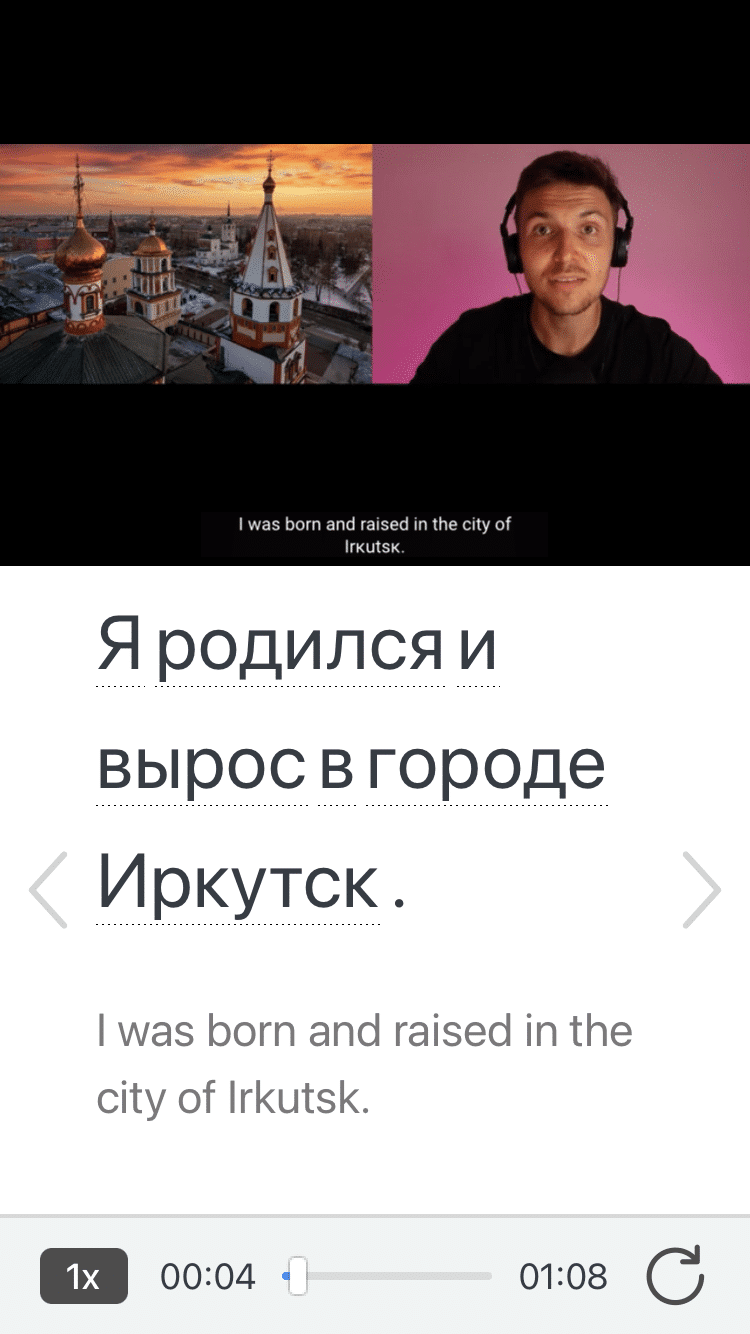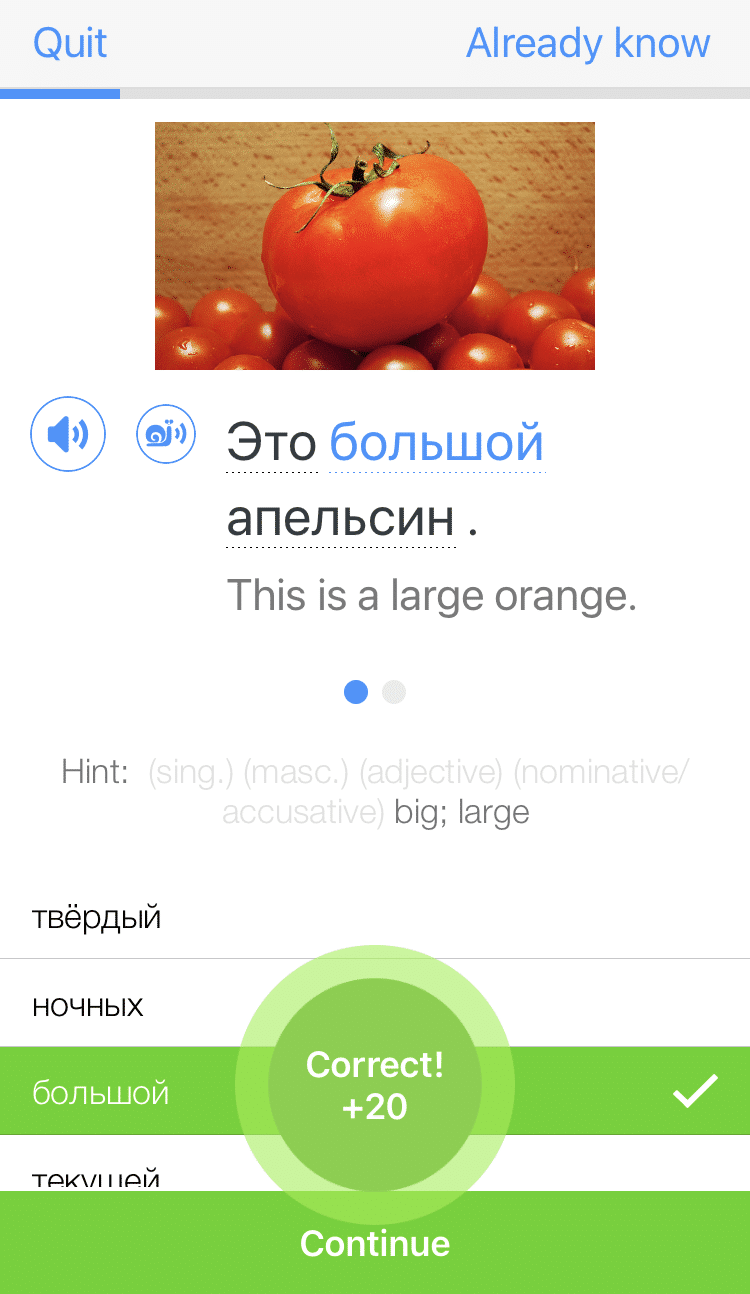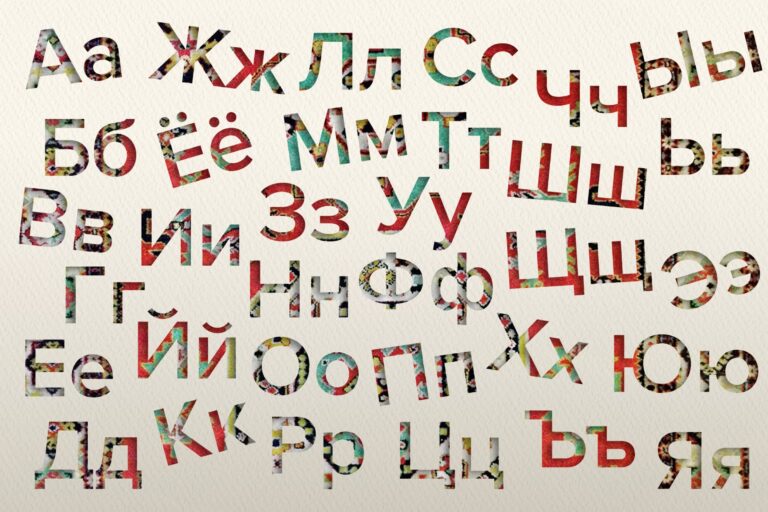Contents
- Greetings and Departures
- Introductions
- Personal Details
- Language Ability
- Agreement, Disagreement and Confusion
- Manners and Polite Phrases
- Food and Drink
- Family and Friends (Including Pets!)
- Useful Adjectives
- Introductory Verbs
- Requesting Assistance and Getting Around
- Basic Russian Slang
- Tips for Learning Russian Words
- And One More Thing...
185 Basic Russian Vocabulary Words and Phrases

Word frequency lists can be a great resource for Russian language learners.
But there’s a caveat: most word frequency lists are taken from written texts, not spoken language.
As a result, commonly-spoken Russian words like привет (hi) and здравствуйте (hello) might not even make it onto some Russian word lists.
This practical, user-friendly, conversation-focused list of basic Russian words promises to fix that!
Plus, we share links to several word lists in case you want to go even deeper into certain topics.
Download: This blog post is available as a convenient and portable PDF that you can take anywhere. Click here to get a copy. (Download)
Greetings and Departures
Naturally, one of the first things any language learner should grasp is the ability to greet other individuals, so here are some of the most common Russian greetings:
| Russian | Romanization | English | Notes |
|---|---|---|---|
| Привет | Privet | Hi | Informal |
| Здравствуйте | Zdravstvujte | Hello | Formal |
| Добро пожаловать | Dobro pozhalovat' | Welcome | Formal or informal |
| Доброе утро | Dobroe utro | Good morning | Used between dawn and noon |
| Добрый день | Dobryj den' | Good afternoon | Used from late morning to sunset |
| Добрый вечер | Dobryj vecher | Good evening | Used in evening hours before dinner |
| Спокойной ночи | Spokojnoj nochi | Good night | Only use when you or someone else is going to bed |
| Пока | Poka | Bye | Informal |
| До свидания | Do svidanija | Good-bye | Most common way to say good-bye |
| До скорого | Do skorogo | See you soon | Informal, use with people you know you'll see again very soon |
23 Ways to Say “Hello” in Russian | FluentU Russian Blog
Can you say hello in Russian? How about a more casual “Hi” in Russian? Check out this post to learn the right Russian “hello” for all occasions! Master 23 Russian…
Introductions
You’ll want to be prepared to introduce yourself and cover some of the basics:
| Russian | Romanization and Pronunciation | English | Notes |
|---|---|---|---|
| Как Вас зовут? | Kak Vas zovut? | What's your name? | Formal |
| Как тебя зовут? | Kak tebja zovut? | What's your name? | Informal, used if asking a child or classmate |
| Меня зовут... | Menja zovut... | My name is... | Formal |
| Я... | Ja... | I am... | Informal |
| Очень приятно | Ochen' prijatno | Nice to meet you | Formal or informal |
| Приятно с Вами познакомиться | Prijatno s Vami poznakomit'sja | Nice to meet you | More formal than Очень приятно |
| Как дела? | Kak dela? | How are things? | Russians don't really ask strangers how they are, so you'll only use this with friends and acquaintances. |
| Как ты? | Kak ty? | How are you? | More casual than Как дела? |
| Вы давно в России? | Vy davno v Rossii? | Have you been in Russia long? | |
| Вам нравится Россия? | Vam nravitsja Rossija? | Do you like Russia? |
Personal Details
Continuing the conversation from above, it’s helpful to be able to explain where you’re from and what you do for a living as these are the two most common questions asked of foreigners.
| Russian | Romanization | English | Notes |
|---|---|---|---|
| Откуда Вы? | Otkuda Vy? | Where are you from? | Formal |
| Я из... | Ja iz | I'm from... | Formal and informal |
| Из какого Вы штата? | Iz kakogo Vy shtata? | Which state are you from? | If you're from the U.S, a well-traveled Russian may want to know more details |
| Вы студент / студентка? | Vy student / studentka? | Are you a student? | Male/Female |
| Кем Вы работаете? | Kem Vy rabotaete? | What do you do for work? | Formal |
| Какая у Вас профессия? | Kakaja u Vas professija? | What profession do you have? | Formal |
| Я... | Ja... | I am a... | Used when telling someone your profession |
| Преподаватель | Prepodavatel' | Teacher | |
| Врач | Vrach | Doctor | |
| Адвокат | Advokat | Lawyer | |
| Есть ли у Вас хобби? | Est' li u Vas hobbi? | Do you have an hobbies? | Formal |
| Я катаюсь на лыжах | Ja katajus' na lyzhah | I ski | |
| Я играю в баскетбол | Ja igraju v basketbol | I play basketball | |
| Я люблю путешествовать | Ja ljublju puteshestvovat' | I love to travel |
Language Ability
These phrases can help you clarify and avoid misunderstandings:
| Russian | Romanization | English | Notes |
|---|---|---|---|
| Вы говорите по-русски? | Vy govorite po-russki? | Do you speak Russian? | Formal |
| Вы говорите по-английски? | Vy govorite po-anglijski? | Do you speak English? | Formal |
| Вы понимаете? | Vy ponimaete? | Do you understand? | Formal |
| Я не понимаю | Ja ne ponimaju | I don't understand | |
| Вы можете говорить медленнее? | Vy mozhete govorit' medlennee? | Can you speak slower? | Formal |
| Помедленнее, пожалуйста | Pomedlennee, pozhalujsta | Please speak more slowly | |
| Повторите, пожалуйста | Povtorite, pozhalujsta | Please repeat that | |
| Как сказать ... по-русски? | Kak skazat' ... po-russki? | How do you say... in Russian? |
Agreement, Disagreement and Confusion
These words and phrases, including how to say “no” and “yes” in Russian, are self-explanatory and commonly heard multiple times a day:
| Russian | Romanization | English |
|---|---|---|
| Да | Da | Yes |
| Нет | Net | No |
| Может быть | Mozhet byt' | Maybe |
| Что это? | Chto eto? | What is that? |
| Кто это? | Kto eto? | Who is that? |
| Я не знаю | Ja ne znaju | I don't know |
| Это... | Eto... | That is... |
Manners and Polite Phrases
Russians are often perceived as being unfriendly, but good manners are appreciated, especially if you’re asking someone for assistance:
| Russian | Romanization | English | Notes |
|---|---|---|---|
| Пожалуйста | Pozhalujsta | Please | |
| Спасибо | Spasibo | Thank you | |
| Спасибо большое | Spasibo bol'shoe | Thank you very much | |
| Пожалуйста | Pozhalujsta | You're welcome | Doubles for "please" |
| Извините | Izvinite | I'm sorry | Formal/plural |
| Простите | Prostite | Excuse me | Can be used interchangeably with Извините |
| Всё в порядке | Vsjo v porjadke | Everything's ok | In response to Извините and Простите |
| Я не могу... | Ja ne mogu... | I can't... | Fill in according to your needs, especially important for someone that has a dietary restriction or limitation |
How to Say Thank You in Russian: 12 Easy Phrases | FluentU Russian Blog
Thank you in Russian can be said in several different ways. In this post, we’ll help you navigate how to say thank you in Russian to different people based on the context.…
Food and Drink
Russians love their traditional foods. While you may not eat borscht or smetana on a regular basis, it’s good to know some basic food vocabulary:
| Russian | Romanization | English | Notes |
|---|---|---|---|
| У Вас есть меню на английском? | U vas yest' menyu na angliyskom? | Do you have the menu in English? | |
| Я хочу есть | Ja hochu est' | I'm hungry | |
| Я хочу пить | Ja hochu pit' | I'm thirsty | |
| Что Вы рекомендуете? | Chto vy rekomenduyete? | What do you recommend? | |
| Борщ | Borshh | Borscht | Traditional sour soup |
| Сметана | Smetana | Smetana | Type of sour cream |
| Блины | Bliny | Bliny | Russian crêpes |
| Икра | Ikra | Caviar | |
| Пироги | Pirogi | Pie | |
| Пельмени | Pel'meni | Pelmeni | Type of Russian dumpling |
| Водка | Vodka | Vodka | |
| Фрукт | Frukt | Fruit | |
| Яблоко | Jabloko | Apple | |
| Банан | Banan | Banana | |
| Овощи | Ovoshhi | Vegetables | |
| Лук | Luk | Onion | |
| Морковь | Morkov' | Carrot | |
| Помидор | Pomidor | Tomato | |
| Картофель | Kartofel' | Potatoes | |
| Салат | Salat | Salad | |
| Мясо | Mjaso | Meat | |
| Колбаса | Kolbasa | Sausage | |
| Рыба | Ryba | Fish | |
| Курица | Kurica | Chicken | |
| Говядина | Govjadina | Beef | |
| Соль | Sol' | Salt | |
| Чёрный перец | Chjornyj perec | Pepper | |
| Хлеб | Hleb | Bread | |
| Масло | Maslo | Butter | |
| Макароны | Makarony | Pasta | |
| Сыр | Syr | Cheese | |
| Чай | Chaj | Tea | |
| Кофе | Kofe | Coffee | |
| Вода | Voda | Water | |
| Сок | Sok | Juice | |
| Молоко | Moloko | Milk | |
| Сахар | Sahar | Sugar | |
| Счёт, пожалуйста | Schot, pozhaluysta | Check, please. |
Russian Food Vocabulary: 120 Words Plus Practice Tips | FluentU Russian Blog
Learnng Russian food vocabulary has got to be at the top of any Russian learner’s list. These 120 common Russian food and drinks words will nourish your language studies!…
How to Order Food in Russian: 65 Words and Phrases | FluentU Russian Blog
How to order food in Russian is a crucial skill if you’re going to be doing any traveling to Russia. Here are 65 essential vocabulary words and phrases that you will need.…
Family and Friends (Including Pets!)
You’ll likely be asked about family members, so be ready to talk about your relatives as well as any pets:
| Russian | Romanization | English |
|---|---|---|
| Семья | Sem'ja | Family |
| Родители | Roditdeli | Parents |
| Мама | Mama | Mom |
| Папа | Papa | Dad |
| Брат | Brat | Brother |
| Сестра | Sestra | Sister |
| Сын | Syn | Son |
| Дочь | Doch | Daughter |
| Бабушка | Babushka | Grandma |
| Дедушка | Dedushka | Grandpa |
| Друзья | Druz'ja | Friends |
| Парень | Paren' | Boyfriend |
| Девушка | Devushka | Girlfriend |
| Домашнее животное | Domashnee zhivotnoe | Pet |
| У тебя есть домашнее животное? | U tebja est' domashnee zhivotnoe? | Do you have a pet? |
| Собака | Sobaka | Dog |
| Кошка | Koshka | Cat |
| Птица | Ptica | Bird |
| Черепаха | Cherepaha | Turtle |
| Кролик | Krolik | Rabbit |
| Рыба | Ryba | Fish |
https://www.fluentu.com/blog/russian/family-in-russian/
https://www.fluentu.com/blog/russian/russian-nicknames/
Useful Adjectives
Here are some common adjectives you’ll need to know:
| Russian | Romanization | English | Notes |
|---|---|---|---|
| Красный | Krasnyj | Red | |
| Белый | Belyj | White | |
| Чёрный | Chjornyj | Black | |
| Синий | Sinij | Blue | |
| Зелёный | Zeljonyj | Green | |
| Жёлтый | Zhjoltyj | Yellow | |
| Розовый | Rozovyj | Pink | |
| Оранжевый | Oranzhevyj | Orange | |
| Красивый | Krasivyj | Beautiful | |
| Симпатичный | Simpatichnyj | Cute/nice | Nice, in reference to temperament; or cute, in reference to appearance |
| Вкусный | Vkusnyj | Delicious | |
| Большой | Bol'shoj | Big | |
| Маленький | Malen'kij | Small | |
| Хороший | Horoshij | Good | |
| Плохой | Plohoj | Bad | |
| Жаркий | Zharkij | Hot | In reference to weather or climate |
| Горячий | Gorjachij | Hot | In reference to an object |
| Холодный | Holodnyj | Cold | Works for weather and objects |
| Старый | Staryj | Old | |
| Новый | Novyj | New |
Weather in Russian: 80+ Words and Expressions | FluentU Russian Blog
Can you talk about the weather in Russian? These words are crucial for making small-talk, planning how to dress and more. In this post, we’ll share how to talk about and…
Introductory Verbs
There are a few basic verbs that most Russian learners almost immediately use. Here are a few to get you started:
| Russian | Romanization | English |
|---|---|---|
| Думать | Dumat' | To think |
| Знать | Znat' | To know |
| Любить | Ljubit' | To love |
| Жить | Zhit' | To live |
| Хотеть | Hotet' | To want |
| Смотреть | Smotret' | To watch |
| Слушать | Slushat' | To listen |
| Играть | Igrat' | To play |
| Спать | Spat' | To sleep |
| Читать | Chitat' | To read |
| Писать | Pisat' | To write |
Requesting Assistance and Getting Around
It’s always good to know how to ask for help and read basic signs so you can find your way:
| Russian | Romanized | English |
|---|---|---|
| Туалет | Tualet | Toilet |
| Где туалет? | Gde tualet? | Where is the toilet? |
| Открыто | Otkryto | Open |
| Закрыто | Zakryto | Closed |
| Вход | Vhod | Enter |
| Выход | Vyhod | Exit |
| Помогите! | Pomogite! | Help! |
| Пожар! | Pozhar! | Fire! |
| Полиция! | Policija! | Police! |
| Стой! | Stoj! | Stop! |
| Я болею | Ja boleju | I am sick |
| Больница | Bol'nica | Hospital |
| Где...? | Gde...? | Where is...? |
| такси | taksi | Taxi |
| метро | metro | Metro |
| аэропорт | aeroport | Airport |
| гостиница | gostinitsa | Hotel |
| ресторан | restoran | Restaurant |
| Один билет, пожалуйста | Odin bilet, pozhaluysta | One ticket, please |
Directions in Russian: 90+ Useful Words and Phrases | FluentU Russian Blog
Lost in Moscow? Then ask for directions in Russian. Check out this post to learn over 90 words, phrases and questions related to directions, landmarks, talking about…
Basic Russian Slang
If you’re feeling adventurous and want to impress a new Russian acquaintance with some fun slang phrases, here are a few you can try:
| Russian | Romanization | English |
|---|---|---|
| Мобильник | Mobil'nik | Cell phone |
| Чёрт! | Chjort | Shoot |
| Бомба | Bomba | Awesome |
| Класс | Klass | Great |
| Круто | Kruto | Cool |
35 Most Used Russian Slang Words [with Audio] | FluentU Russian Blog
Looking for some Russian slang? Look no further. We have 35 of the best Russian slang words for you to liven up your spoken Russian skills. Words such as дешёвка (a…
Tips for Learning Russian Words
Here are some important tips and tricks to advance your Russian studies:
1. Learn the Alphabet
Hopefully, you’re already aware that Russian uses the Cyrillic alphabet, not the Roman alphabet.
Be sure to learn the 33 letters of the Russian alphabet and the corresponding pronunciations. To a large extent, Russian sounds the way it’s spelled, so you can see words written and sound them out if you know how the individual letters are pronounced.
2. Emphasize Listening and Speaking
Linguistic input is crucial, especially when starting a new language. Input-based learners may attempt to immerse themselves in a language by reading, practicing with flashcards, listening to music, watching movies or a host of other techniques.
If your aim is to communicate with people, be sure you’re training your ear. Don’t hesitate to watch YouTube clips with vital words over and over again.
By the same token, be sure you’re speaking. Listen to a clip and then repeat it. Your mouth needs to become comfortable making the unfamiliar sounds common in Russian.
Tutors are also invaluable resources. They can help you perfect your pronunciation to ensure you’re well understood. They can also get you accustomed to the pace of speech.
As with any language, some Russians speak quickly, mumble or run their words together. A tutor can help you get used to deconstructing what you’re hearing.
Getting into authentic Russian content is also important. As a beginner, this might get a bit overwhelming, so you might want to start with material aimed at children.
Some programs make it a bit easier to sort media according to difficulty. FluentU, for example, has six learner levels in its virtual immersion program.
FluentU takes authentic videos—like music videos, movie trailers, news and inspiring talks—and turns them into personalized language learning lessons.
You can try FluentU for free for 2 weeks. Check out the website or download the iOS app or Android app.
P.S. Click here to take advantage of our current sale! (Expires at the end of this month.)
3. Focus on Simple Sentences First
You’re not going to be able to form complex grammatical sentences as soon as you learn the Cyrillic alphabet. As with learning any language, you need to start with basic constructions such as:
Я хочу яблоко. — I want an apple.
Я хочу собаку. — I want a dog.
Я хочу парня. — I want a boyfriend.
As you learn new grammar concepts, your sentences will become longer and more complex, but it’s important to start small and build from there.
4. Keep Formality in Mind
Similar to French or Spanish, Russian uses two versions of the word “you” that differ based on formality.
Ты (you) is used in informal situations when speaking to an individual. Вы (you) is used in two instances: when speaking to two or more people and when speaking to an individual in a formal manner.
As a general rule, ты should really only be used when addressing children or close friends. The formal Вы should be used any time you’re speaking to strangers, acquaintances you don’t know well, anyone older than you or someone in a position of authority.
The list of basic Russian words and phrases above is far from comprehensive, but should help set you on track to start feeling comfortable speaking Russian from day one.
If you’re feeling up for it, you could even check out some more challenging words now to impress your Russian friends!
Удачи!
(Good luck!)
Download: This blog post is available as a convenient and portable PDF that you can take anywhere. Click here to get a copy. (Download)
And One More Thing...
If you love learning Russian and want to immerse yourself with authentic materials from Russia, then I should also tell you more about FluentU.
FluentU naturally and gradually eases you into learning the Russian language and culture. You'll learn real Russian as it's spoken by real Russian people!
FluentU has a very broad range of contemporary videos. Just a quick look will give you an idea of the variety of Russian-language content available on FluentU:

FluentU makes these native Russian videos approachable through interactive transcripts. Tap on any word to look it up instantly.

Access a complete interactive transcript of every video under the Dialogue tab. Easily review words and phrases with audio under Vocab.

All definitions have multiple examples, and they're written for Russian learners like you. Tap to add words you'd like to review to a vocab list.
And FluentU has a learn mode which turns every video into a language learning lesson. You can always swipe left or right to see more examples.

The best part? FluentU keeps track of your vocabulary, and gives you extra practice with difficult words. It'll even remind you when it’s time to review what you’ve learned. You'll have a 100% personalized experience.
Start using the FluentU website on your computer or tablet or, better yet, download the FluentU app from the iTunes or Google Play store. Click here to take advantage of our current sale! (Expires at the end of this month.)








